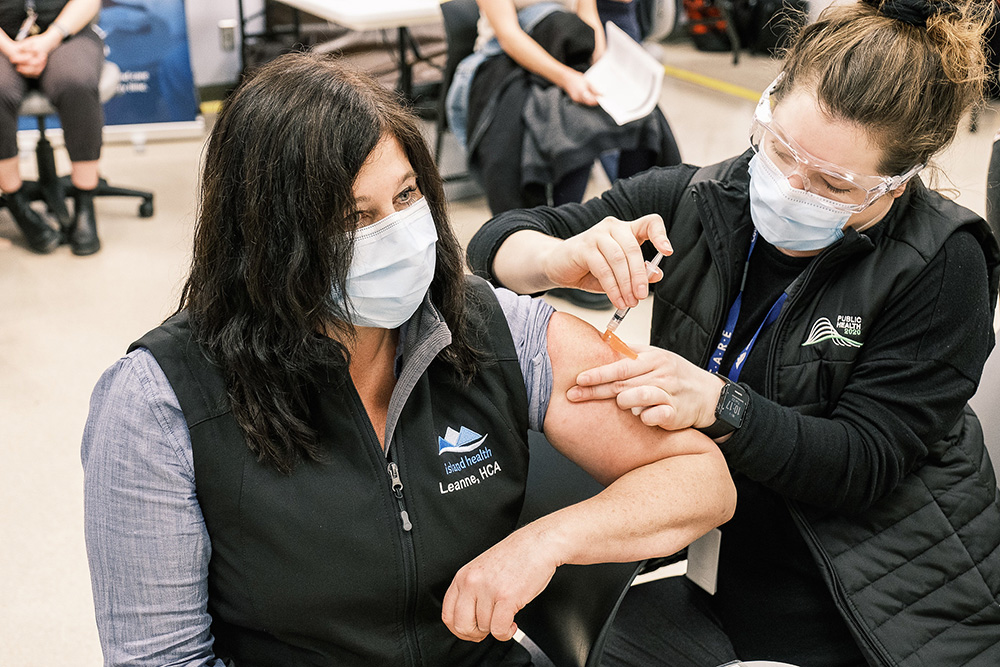COVID-19 is a killer: 26,000 Canadians have died of it so far, with more than 1.4 million suffering its serious effects. These numbers include frontline health workers charged with caring for pandemic victims. More than 65,900 of them have caught COVID-19. At least 24 have died.
Vaccine supplies are increasing as we continue to wrestle with this pandemic. Yet some health-care workers — and there are 30 distinct groups of them in Canada, including care aides, therapists, nurses and physicians — are choosing not to be immunized.
In late April, four months after vaccines arrived in Canada, health-care worker vaccination rates ranged from about 50 per cent in acute-care facilities in Alberta to an estimated 90 per cent in some Ontario hospitals.
The needless risk to the public, whether in a hospital, clinic or long-term care, increases with every contact from a worker who may not have been vaccinated. Lacking crucial information on a worker’s vaccine status, Canadians cannot assess risk of infection, illness and even death.
Vaccine hesitancy has many causes. Workers in long-term care homes, for example, justifiably fear missing a shift and losing income; they are an underpaid, undervalued workforce.
Yet we must not forget the suffering that care-home residents are experiencing during the pandemic.
How can we protect these vulnerable citizens now or during a future pandemic? How can we trust that any of us is safe from infection by any worker across our health system?
At present, frontline health workers don’t have to declare their COVID-19 vaccine status because of privacy laws, labour agreements and charter rights.
But we should at least require that direct care workers disclose to employers whether they have been fully vaccinated. If workers refuse to disclose, they should be required to take repeated, regular rapid testing.
Similarly, patients, residents and visitors should disclose their vaccination status or take a rapid test. Any patients being transferred from hospital to other health-care settings should be tested.
Finally, patients and their families should be given the choice to refuse care from workers who have not been vaccinated. It would not require public disclosure of worker names to allow families to choose to limit care to vaccinated workers only.
Such regulations would help us through COVID-19, but developing a national policy requiring vaccination of all health-care staff should be the goal to avert future public health crises.
Some provinces are already finding ways to lower risk. Quebec recently began requiring personnel in certain units to provide proof of immunization or else face repeated testing, possible reassignment or even unpaid leave. Ontario requires health-care workers to be vaccinated or enrol in a vaccine education program.
B.C. provincial health officer Dr. Bonnie Henry says she wants to look at all options to ensure long-term care workers, in particular, are immunized. Residents are so vulnerable to COVID-19 — they are older, often recovering from a hospitalization, sharing rooms and often living in old buildings with poor ventilation. Many residents are fully vaccinated and yet some staff have yet to receive their initial arm jab. If the virus circulates in the community, an unvaccinated staff member can bring it to the nursing home, where conditions may make the otherwise rare breakthrough infections more likely. The examples are tragic, ongoing and needless.
The high proportion of coronavirus deaths in Canadian nursing homes is our national shame — eight out of every 10 deaths compared to about 40 per cent worldwide. Spring Valley, a long-term care facility in Kelowna, B.C., had an outbreak in May. Although 97 per cent of residents were vaccinated, vaccine uptake was limited to 67 per cent of staff. Eleven people died. (The owner of Spring Valley has since announced a mandatory vaccination policy for new hires.)
The bottom line is trust: the pandemic makes it clear that COVID-19 vaccination should not be a personal choice, particularly among health-care staff. We must make sure that those who are not vaccinated can’t get close enough to infect our powerless and vulnerable loved ones. We must rely on vaccination as the key evidence-based practice that can protect health-care staff, their colleagues and the public. Given the deadliness of this virus, it should be much harder to refuse vaccination than receive it. ![]()
Read more: Coronavirus
















Tyee Commenting Guidelines
Comments that violate guidelines risk being deleted, and violations may result in a temporary or permanent user ban. Maintain the spirit of good conversation to stay in the discussion.
*Please note The Tyee is not a forum for spreading misinformation about COVID-19, denying its existence or minimizing its risk to public health.
Do:
Do not: